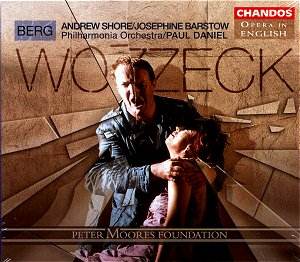I have to nail my colours to the mast straightaway
and say I am generally of the opinion that opera should be performed
in the language intended for it by the composer. So it is a surprise
(and a happy one) to report that this English language version
of Wozzeck is an almost unqualified success. This is probably
due to two things. One is that the German language lends itself
better than most to being translated into English. The other is
the quality of Richard Stokes’s version, which is intelligent,
literate and, above all, musical.
I have a number of CD versions of Wozzeck
in my collection, as well as two video productions. My long-standing
favourite is Dohnanyi with the VPO on Decca, sumptuously recorded,
superbly played and with outstanding vocal leads. Whilst this
new English version is unique from the language point of view,
it is possible to compare all other aspects, and the Chandos is
not wanting in any major area. I was privileged, in the early
1990s, to see the Opera North production on which this recording
is based and remember vividly being bowled over by Andrew Shore’s
memorable assumption of the title role, as well as Deborah Warner’s
spare, Expressionist production. I was also mightily impressed
by Paul Daniel’s handling of the orchestra. In his hands we were
treated to an almost Straussian richness of sound, a revelling
in Berg’s originality of texture and a keen ear for the longer
line, so that detail did not overtake the bigger picture. Ten
years on, Shore’s performance has matured into something deeper
and even more moving, and Daniel’s conducting has similarly accrued
the kind of authority that puts it up with the best.
Although Wozzeck is an ensemble piece,
it is important that the two main protagonists, the pathetic anti-hero
Wozzeck and his ‘harlot with a heart’ partner Marie, are totally
believable. Some recorded performances (Fischer-Dieskau comes
to mind) rather ham it up, overdoing the sprechstimme and
going over the top in certain scenes, such as the death of Marie.
Andrew Shore strikes me as achieving a near ideal balance of mania,
helplessness and nobility. He is determined that we should not
just feel sorry for Wozzeck’s plight, but that we should understand
the wider social implications – that Wozzeck is a victim of the
system. The very opening sets the scene perfectly; Wozzeck is
shaving the Captain, his immediate superior, who taunts and mocks
him constantly. Wozzeck responds monosyllabically ‘Just so, Herr
Hauptmann’. When we get to the great four-note refrain that acts
as a kind of humanist motto ‘Wir arme Leut’ (usually translated
as ‘We poor folk’ but here set as ‘Wretches like us’, which perfectly
fits the musical pattern), Shore and Daniel broaden the phrase
just a touch, investing it with the kind of dignity that Berg
surely intended. This is one example of many throughout the performance
where Shore illuminates phrases, responding to the excellent translation
with real insight. He does not really let go until the final act,
where he wanders around desperately yelling ‘Murder, murder!’
in a state of crazed panic, yet even here we feel someone should
help him instead of condemning him, as we know would happen.
As Marie, Dame Josephine Barstow gives a performance
of equal depth and sincerity.
At times she doesn’t quite sound common enough,
with a rather cultured ‘opera’ accent apparent in some of the
venomous exchanges with Margret (Act 1, scene 3). But she is unbearably
moving in Act 3, as she reads to her child from the Bible the
story of the adulterous woman. Her exchanges with Wozzeck tingle
with tension. When she finally gives herself to the Drum Major
at the end of Act 1, her delivery of the words ‘Why should I care?
Who could give a damn?’ seem to sum up the whole tragedy of her
pitiful life.
Talking of the Drum Major, there’s a marvellously
bullish portrayal from Alan Woodrow here. He does not shirk from
the extremities of the character, which are here highlighted by
the translation. As he drunkenly assaults Wozzeck in the barracks
(Act 2, scene 5) he pulls no punches with the lines ‘Bas**rd,
shall I rip your tongue from your gullet and wrap it round your
f***ing neck?’ This is typical of a scene where one is shocked
anew at the effectiveness of this piece in English, almost like
hearing it for the first time. All the other characters seem to
relish being able to sing a translation of this quality; indeed,
I was happily able to read through the full text (included in
the booklet) just for the sheer pleasure of the language.
The Philharmonia Orchestra plays superbly, and
though they may not have the razor-sharp ensemble of Dohnanyi’s
Vienna forces, the strings display great tonal weight and the
many instrumental solos have real character. In Daniel’s expert
hands, the famous D minor Interlude, effectively a symphonic summing
up of the opera, has opulence and gravitas and sounds (quite appropriately)
like a miniature Mahler slow movement. Certainly the recording
Chandos gives them helps the aural experience, with superb presence,
clarity and bloom on the sound. Notes are by a staunch supporter
of this Chandos series, the Earl of Harewood, who gives his own
interesting slant on the piece, including his first acquaintance
with it in Boult’s famous 1949 concert performance.
Wozzeck is a relatively short opera and
many, including Dohnanyi, include a filler (in his case, a superb
performance of its spiritual ancestor, Schoenberg’s Erwartung).
There is nothing here, though I understand Chandos are offering
the set at mid-price. This should entice people to try it, for
it certainly provides many new insights and rewards, and makes
comparison almost pointless. Whether you feel (like me) that you
really know the work, I guarantee this is worth hearing, and will
give you a fresh and illuminating perspective on one of the twentieth
century’s most harrowing and original masterpieces.
Tony Haywood
